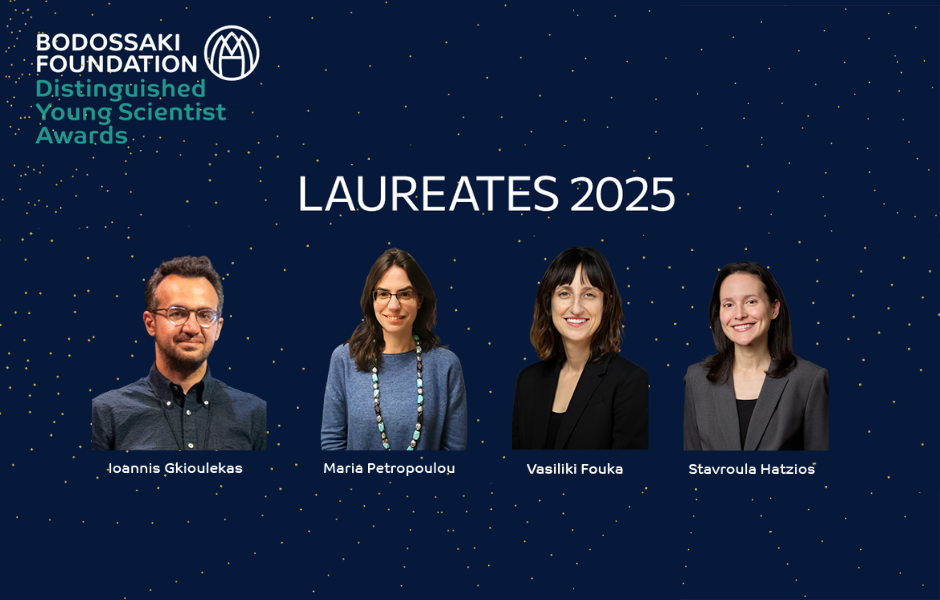How do social and group identities influence voting behaviour, choice of partner or place of residence, and phenomena such as violence against members of other racial groups? What mechanisms are involved in the gastrointestinal system’s role in generating oxidative stress? Can we image the entire cerebral cortex in living humans using computational imaging techniques? How are particles accelerated in astrophysical plasmas? These are just a few of the pioneering questions being explored by this year’s recipients of the Bodossaki Distinguished Young Scientist Awards. Discover the new frontiers opening in the world of science and the individuals leading the way:
- Vicky Fouka, Associate Professor of Political Science at Stanford University, is awarded the Bodossaki Distinguished Young Scientist Award 2025 in the field of Social Sciences: Political Science.
- Stavroula Hatzios, Associate Professor of Molecular, Cellular, and Developmental Biology and of Chemistry at Yale University, is awarded the Scientific Prize in the field of Life Sciences: Biomedical Sciences.
- Ioannis Gkioulekas, Associate Professor at the Robotics Institute of Carnegie Mellon University, is awarded the Scientific Prize in the field of Applied Sciences/Technologies: Artificial Intelligence.
- Maria Petropoulou, Assistant Professor of Physics at the National and Kapodistrian University of Athens, is awarded the Scientific Prize in the field of Basic Sciences: Physics.
The Award Ceremony for the Bodossaki Distinguished Young Scientist Awards 2025 will take place in June at the Zappeion Hall.
Since 1992, in line with the Bodossaki Foundation’s mission to promote education and champion scientific excellence, 65 Greek scientists have been honoured through the institution of the Bodossaki Distinguished Young Scientist Awards, which recognise the work of scientists who are Greek by citizenship or descent, up to the age of 40. The criteria for the Bodossaki Distinguished Young Scientist Awards include the candidate’s outstanding performance in their own scientific field, as demonstrated through a substantial body of work, their contribution to the intellectual, scientific, and economic development of Greece, and the extent to which their ethical conduct and research promote Greece internationally.
The Work of the 2025 Bodossaki Distinguished Young Scientist Awards Laureates
Vicky Fouka studies the factors shaping social and political behaviour, as well as the formation of social and group identities, aiming—among other things—to draw conclusions for public policy design. Her research integrates theoretical tools and methods from various social science disciplines, combining models of human behaviour from economics and social psychology. Using historical data, she examines how concepts such as social and group identities evolve over time, how they are influenced by government policies, and their impact on significant social and political behaviours like voting patterns, partner selection, place of residence, and incidents of violence against members of other racial or ethnic groups. Her work has been published in leading journals such as the American Political Science Review, Annual Review of Political Science, and Review of Economic Studies. She has received awards including the Austin Robinson Memorial Prize (Economic Journal) and the Joseph L. Bernd Best Paper Award (Journal of Politics).
Stavroula Hatzios aims to discover new therapeutic tools for gastrointestinal infections and gastrointestinal cancers by combining chemistry and microbiology. The primary objective of her laboratory’s research programme is to understand how bacterial and host cells adapt to oxidative stress during infection, as this adaptation can contribute to the development of serious diseases. Her team has identified key pathways and antioxidant defence mechanisms that improve disease diagnosis and treatment, including for serious gastrointestinal cancers. She has published extensively in international scientific journals such as Nature Chemical Biology and Cell, and has received honours including the Sloan Research Fellowship in Chemistry and the Beckman Young Investigator Award.
Ioannis Gkioulekas works at the intersection of artificial intelligence, computer vision, and computer graphics, with a focus on computational imaging. He investigates the integration of optical, electronic, and computational techniques to develop imaging systems with unprecedented capabilities. His research finds applications in medicine—non-invasive imaging of blood vessels or brain cells; in disaster response and monitoring via optical tomography systems; and in navigation and surveillance systems capable of “seeing” around corners. His contributions have significantly advanced volumetric imaging and earned him notable recognition, including the NSF CAREER Award and the Sloan Research Fellowship.
Maria Petropoulou seeks solutions to fundamental problems in astrophysics, with a focus on radiation processes in astrophysical plasmas, high-energy particle acceleration, and neutrino production. Since launching her independent research career in 2020, she has made a significant impact, authoring 97 peer-reviewed publications, receiving approximately 3,700 citations, and achieving an h-index of 35. Her primary research interests are High-Energy and Multi-Messenger Astrophysics.
About the Bodossaki Distinguished Young Scientist Awards Selection Process
The selection process for the Bodossaki Distinguished Young Scientist Awards is overseen by two main bodies:
- the Young Scientist Awards Committee
- the Selection Committees
Candidates may be nominated either by scientists of the same or higher academic rank in the same field, or by the academic institutions with which they are affiliated. For each field in which a prize is awarded, a dedicated Selection Committee is established. These committees evaluate the nominations and submit their recommendations to the Young Scientist Awards Committee, which then proposes the final candidates to the Foundation’s Board of Directors for approval.
Members of the Young Scientist Awards Committee
- Ioannis Aifantis, Professor of Pathology, NYU School of Medicine
- Theodora Varvarigou, Professor at the School of Electrical and Computer Engineering, National Technical University of Athens
- Nikos Vettas, Professor at the Department of Economics, Athens University of Economics and Business, and Director General of the Foundation for Economic and Industrial Research (IOBE)
- George Kollias, Member of the Academy of Athens; Professor and Director at the Laboratory of Physiology, Medical School, University of Athens; Research Professor, ‘Alexander Fleming’ Biomedical Sciences Research Centre
- Nancy Makri, Professor of Chemistry and Physics, University of Illinois at Urbana-Champaign
- Costas Meghir, Professor of Economics, Yale University
- Michael Triantafyllou, Professor of Marine Technology, MIT; Visiting Researcher, Woods Hole Oceanographic Institution; Director, Center for Ocean Engineering and Testing Tank Facility and Propeller Tunnel, MIT, Director of the Center for Ocean Engineering and Director of the Testing Tank Facility and the Propeller Tunnel of the Massachusetts Institute of Technology (MIT)
- Athanassios Fokas, Professor of Applied Mathematics and Theoretical Physics, University of Cambridge
Representing the Bodossaki Foundation on the Committee are:
- Athina Dessypri, President of the Board of Trustees, Bodossaki Foundation
- Doros Theodorou, Vice-President of the Board of Trustees, Bodossaki Foundation Professor, School of Chemical Engineering, National Technical University of Athens
This year marks the 13th award cycle of the Scientific Prizes, honouring the outstanding achievements of young Greek scientists and the significance of their research on the global stage.

